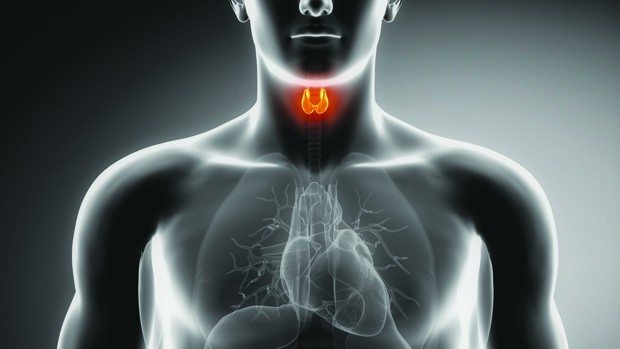The Heart and the Thyroid Gland
Diseases of the thyroid gland can directly alter the normal function of the heart and cause significant complications and personal discomfort. To better understand why, it is helpful to appreciate how the heart works.
The heart itself is a muscle. It requires oxygen to work and receives it via coronary arteries. If there is disease in these coronary arteries causing a blockage within the lumen (opening) and a reduction in coronary blood artery blood flow, the heart muscle then works with an inadequate oxygen supply and heart pain, or angina, can be produced.
Additionally, in order for the heart to beat in a coordinated fashion and expel blood smoothly and efficiently, the heart muscle is stimulated to contract in a synchronized fashion by specialized tissues within the heart that conduct electrical impulses. The impulse normally starts at the top of the right atrium and spreads down through the heart.
When a patient is in a hyperthyroid state, increased levels of thyroxine are released from the thyroid gland and stimulate the heart to beat more quickly and strongly. Initially, this may produce a fast heart rate, or tachycardia. In some patients, prolonged stimulation of the heart may cause an irregular heartbeat. Functionally, this occurs where the electrical impulses form a short circuit within the atria and cause partial or poorly coordinated atrial contractions.
Prolonged and irregular stimulation such as this can cause some increase in blood pressure, or systolic hypertension. The diastolic blood pressure, the lower of the two blood pressure numbers, is not normally increased. The increased contraction of the heart, with increased cardiac output, causes a pulse that is easily felt at the wrist and contributes to warm, sweaty hands.
Symptoms and signs of heart problems for an underactive thyroid gland tend to be the opposite. They consist primarily of slow heart rate and low blood pressure. Common symptoms include constipation, poor blood flow and lightheadedness or dizziness upon standing. Prolonged hypothyroidism causes metabolic changes in the body and may produce elevated levels of cholesterol, for example. There is much media attention surrounding some types of elevated cholesterol levels that may produce or aggravate narrowing of the coronary arteries. However, a more exciting area of research now examines the role of blood pressure in regulating cellular nutrition.
Nitric oxide is what the body uses to stimulate the blood vessels to expand and contract and keep blood pressure in check. Men and women with poor circulation or a history of thyroid or heart disease, including many common symptoms like high blood pressure and elevated cholesterol, are often deficient in the critical molecule nitric oxide. Precursors for the synthesis of nitric oxide include dietary amino acids such as L-arginine, ornithine and citrulline. The right balance has been shown to stimulate growth hormone for anti-aging benefits, improve insulin sensitivity to help normalize blood sugar and increase fertility and pleasure sensation by stimulating oxygenation and blood flow.
Dr. Douglas J. Pucci, DC, FAAIM, regularly offers in-office seminars presenting the latest science and clinical data on neurotoxic illness, hormone disruptions and chronic disease. He provides nutrition, comprehensive testing for health biomarkers, brain and body care and more. For more information, call 201-261-5430 or visit GetWell-Now.com.





























